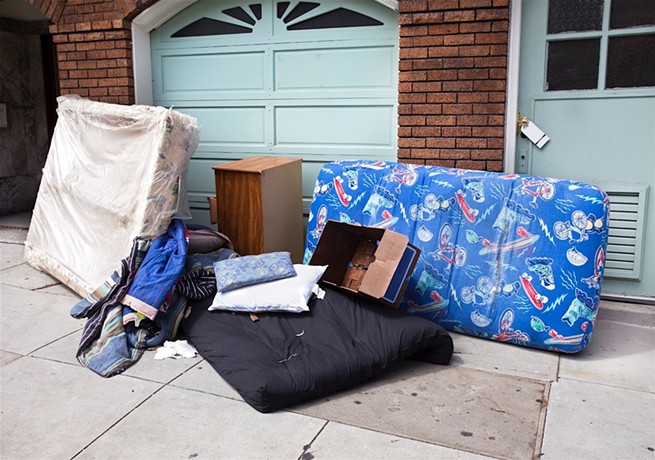When there is property left behind and a tenant moves out?
When there is property left behind and a tenant moves out?
 While it can be tempting to simply throw it all away and move on with your life, this may not always be the best solution. There are specific legal steps that you must take, and your tenant may even owe you money for their actions.
While it can be tempting to simply throw it all away and move on with your life, this may not always be the best solution. There are specific legal steps that you must take, and your tenant may even owe you money for their actions.
Did you know that you may even have to enlist some help from your local Sheriff? Learning the proper steps from alerting the tenant about their property to filing with local law enforcement for property removal is essential for landlords. By following the correct procedure, you’ll know exactly what to do with property left behind when a tenant moves out in the future.
What you need to know.
Why Did The Tenant Leave?
The first thing that you need to do is review why the tenant has left the property. Depending on their reason for departure, they may still have some rights to the property they left behind. Before you dispose of or sell anything, check their reason for leaving on the following list:
- Lease Ended
Most states give you nearly full freedom to dispose of any belongings left behind if a lease period was ending. - Termination Notice Served
If you gave them a termination or early-lease ending notice and they left on time, most states give you nearly full freedom to dispose of any belongings left behind. - Evicted
If you had to have your tenant evicted, often with involvement from the Sheriff, you may be responsible for ensuring that their belongings get back to them. Every state has different rules about this, so you will want to check your state’s laws.
In most cases, evictions will be handled fully by local law enforcement, including the removal of their property and what property you are entitled to sell to receive payback for any unpaid rent. Since evictions are handled by specific court processes, the specifics are not covered in this article. - Leaves Without Notice
Similar to the eviction case, tenants that disappear without any notice may still have some rights to the property they left behind depending on where you are located. Check your local laws before disposing of or selling anything.
Warning: Check The Local Laws
While all of this advice can be used no matter where you live, it is important that you check your local property and tenant laws before you remove property. As previously mentioned, it is possible that the tenant still has rights to the items. Most jurisdictions have specific procedures that landlords must follow before they can get rid of belongs. If you follow the laws, you will be protected from any former tenants attempting to come after you for damages or loss of property fines.
How To Find Your Local and State Laws
As you have probably already noticed, the way that you must deal with regarding property left behind when tenant moves out is very dependent on where you live. Because of that, you will need to get in contact with local jurisdiction or review state laws to be sure that you are following the proper course of action. However, finding these laws isn’t always easy. Here are a few resources to help you find the information that you need to deal with property left behind when a tenant moves out.
State Laws & Statutes
Find your state’s listing on this page to find out which law or statute you need to refer to for specific information about your situation.
Local Landlords
Are you friends with other landlords or aware of a few high-stakes landlords in the area? Reach out and ask for advice about your situation. They are likely to be familiar with the rules. If that doesn’t work, you can try reaching out to the National Apartment Association or National Multifamily Housing Council for advice on how to find out more information.
Lawyers
If you are dealing with a lot of valuable property that has been left behind, it is probably worth contacting a lawyer to be sure that you are able to dispose or sell the property. Lawyers can give you the best advice in these situations, as they can research any local laws for you.
Review Your Rental Terms
Because left behind property can be a big issue for landlords, you may decide to include a clause in your original rental contract that addresses any property that is left behind. Before touching any belongings, double-check the rental contract for any terms that may refer to this type of situation. Depending on the contract used, you may even be entitled to disposal fees for getting rid of your former tenant’s property.
Adding a Rental Clause About Abandoned Property
It’s always a good idea to include a clause about abandoned property in your rental contract. Some tenants may not worry about cleaning up trash or merely leaving behind old items they do not want anymore when they move out. While it may not seem like a big deal, it can be costly to dispose of larger items. While it may seem excessive to add this type of clause to your rental contract, doing so will protect you from future costly events.
Talk to your advisor or lawyer about adding a belongings clause to your contract:
- State that there will be a disposal fee for excessive trash or abandoned property left behind.
- Specify that belongings must be disposed of.
- Include the potential for a separate agreement for storage as needed (i.e., you can offer to keep the former tenant’s furniture on the property for a specific period until they can pick it up).
Give The Tenant Legal Notice
Once you have familiarized yourself with the specifics of local laws as well as the rental agreement that was in place between you and the former tenant, it’s time to reach out to the tenant. Many states require that you give tenants that have left abandoned property behind a specific legal notice and period during which they have to collect their belongings.
What To Include In The Notice
When you’re documenting the following information for an abandoned property notice, it is essential to have an objective observer come along to protect you from any fraudulent charges. Additionally, photos and video can be helpful in case the situation should escalate.
Include the following in your notice:
- Description of abandoned property (hint: do not open anything that is locked)
- Estimated value
- Where the property will be held
- Deadline for retrieval (the length of this period is typically indicated by local or state laws)
- What will happen after that period
Inventorying Items
The notice you give your tenant must have a detailed inventory of the items left behind, and this means that you must create such an inventory. It is imperative that you have a written and/or photographic record of everything that is left behind. Any property that has value must be recorded and stored. Since assigning a value to various personal belongings differs from person to person, the safest thing to do is to inventory everything that was left behind in great detail. When inventorying items, be sure that you do not open any locked items. These items should remain locked until you have a clear decision on what will be done with the property.
It is legal to keep the items on the rental property, but many property owners want to begin cleaning the space for the next tenant. If that’s the case, you are permitted to secure the belongings in a storage facility or similar space. Information about where the items are being stored must be included in any official notices or documents.
How To Send The Notice
When you send the notice, be sure that you request a return receipt. This will give you proof that the tenant received the notice should they not claim their belongings and return at a later date.
Handling Removal
If the notice period passes and the tenant does not return to get their belongings or they have no right to belongings left behind based on your local laws, it is time to move on to disposal and sale of their abandoned property. Check state laws before selling or disposing of property. In some areas, the abandoned property must be given over to the state. In others, you are free to dispose of it as soon as the notice period ends. The following tips refer to how to dispose of items economically and efficiently.
Dump Any Trash
If you haven’t already done so, you should remove any trash from the property. Trash is anything that is obviously not a valuable piece of personal property, and this can usually be removed without any other state requirements. The clean-up costs from removing trash (which can be expensive) can legally be deducted from the security deposit that your tenant paid down on the property, so be sure to subtract them.
Organize a Sale or Keep The Items
Many states require that you hold a public sale of the abandoned items. You can set this up with a local bond agency, and the proceeds of the sale can often be used to cover the costs of storing, selling, and advertising. Depending on the state, you might be able to keep the remaining proceeds. In some states, the balance must be paid to the state. If your state does not require you to pay anything back or hold a public sale, you can simply sell off the items as you please. You can even keep the items if you prefer to do so.
Can You Pay Yourself Back?
Most state laws share one similarity: You can be paid back for unpaid damages and rent from the sale of abandoned property. If your tenant left without paying for damages or rent, the proceeds from the belongings sale can often be used to pay off this debt. State laws will dictate the specifics of how this must be handled. In many cases, you should keep an itemized list of the items and can deduct the cost of disposing of them from the security deposit.
Exception Items
There are two main categories of items that you do not have to worry about these rules for, as they have exceptional statutes related to their abandonment.
Motor vehicles
If a car or other motor vehicle is left behind, it should be considered an abandoned vehicle and reported to local police. Law enforcement will handle its filing, removal, and return.
Fixtures
Permanent fixtures installed at the property by tenants – such as built-in bookshelves or lights – are considered part of the property. They are yours to keep and do not need to be reported. If the tenant added permanent fixtures that you did not approve, you are allowed to use the security deposit to cover the cost of removal. You should always check for this type of issue before releasing a former tenant’s security deposit to protect yourself from any extra losses.
Know Your Rights
There may be cases where a former tenant will return well after the end of their legal notice period and expect to receive their belongings or the value of the items. If this is the case, your state should have specific laws on what they can or cannot receive. If you sold the items, it is possible that the former tenant has a right to receive the proceeds beyond what was required to pay you back for the sale and storage of the items. There is typically a limitation period on this type of situation. If you kept or disposed of the items, however, the tenant typically has no rights to compensation for the items. They did not come during the notice period, so the belongings became yours.
A Complex Process
As you can see, handling any tenant property left behind is not as simple as just selling or disposing of it. Due to the complex nature of rental and tenant laws, you must follow your local rules to handle the situation legally. Some people might even leave their pets behind! (Really, it has happened). Still, you have to follow the rules to handle even the most extreme cases.
In its most basic form, this is what you need to do when a tenant moved out and left their belongings:
- Determine why they left & check local laws for specific rules
- Review your rental terms for clauses related to abandoned property
- Document and inventory the abandoned property and damages
- Give former tenant legal notice of abandoned property
- Sell, dispose of, or store the property, depending on local laws
- Pay yourself back for unpaid rent, etc.
- Know your rights by getting in contact with a local lawyer
If you stay organized throughout this process, you’ll be able to reclaim your rental property and deal with the abandoned property while minimizing your monetary risk, if any. You will have to spend a lot of time on this process, but handling it legally and adequately will pay off in the long run.
Tags: Eviction Information, Landlord Information, Legal Articles, Tenant Information




 Sometimes it is obvious when a tenant abandons a property, such as when they move out in the night and leave you a note and a property full of garbage. Other times, it may be difficult to tell whether the tenant has abandoned the rental unit. In their hurry to turn over a rental unit and get rid of a bad tenant, some landlords may make the mistake of assuming the property is abandoned when in fact it is not.
Sometimes it is obvious when a tenant abandons a property, such as when they move out in the night and leave you a note and a property full of garbage. Other times, it may be difficult to tell whether the tenant has abandoned the rental unit. In their hurry to turn over a rental unit and get rid of a bad tenant, some landlords may make the mistake of assuming the property is abandoned when in fact it is not.

 Landlord-tenant court is a notoriously nasty place. In New York, for example, housing court has become a tool of landlords trying to push out rent-controlled tenants. In Philadelphia, one out of every 14 tenants faces eviction every year, and those fights play out in housing court.
Landlord-tenant court is a notoriously nasty place. In New York, for example, housing court has become a tool of landlords trying to push out rent-controlled tenants. In Philadelphia, one out of every 14 tenants faces eviction every year, and those fights play out in housing court.












